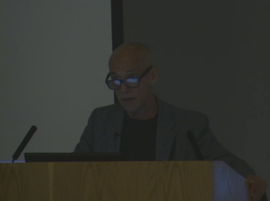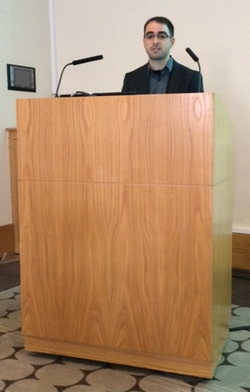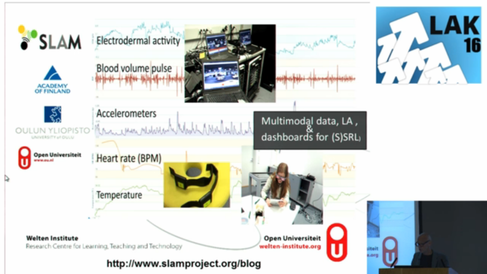
Three SLAM researchers – Paul A. Kirschner, Hendrik Drachsler and Héctor J. Pijeira Díaz – participated in the Sixth Learning Analytics and Knowledge Conference (LAK16). The conference was held in Edinburgh, the inspiring capital of Scotland, from April 25 to 29.
Professor Paul Kirschner, SLAM principal researcher, engaged the audience to reflect on utopias and dystopias in the field of learning analytics with his keynote opening the Thursday session. The talk made a strong impact on the audience and Professor Sir Timothy O'Shea, first in the question round, expressed: “that's one of the best keynotes I've ever seen”. As a summary, following are Prof. Kirschner’s dystopias and utopias:
Professor Paul Kirschner, SLAM principal researcher, engaged the audience to reflect on utopias and dystopias in the field of learning analytics with his keynote opening the Thursday session. The talk made a strong impact on the audience and Professor Sir Timothy O'Shea, first in the question round, expressed: “that's one of the best keynotes I've ever seen”. As a summary, following are Prof. Kirschner’s dystopias and utopias:
- Dystopia 1: Myopic vision of what learning is
- Dystopia 2: theory free / theory poor LA
- Dystopia 3: looking at wrong or invalid variables
- Dystopia 4: seeing correlation as causal
- Dystopia 5: unintended and unwanted effects
- Utopia 1: Knowing the future (and when and why)
- Utopia 2: Custom tailored learning and instruction
- Utopia 3: the right thing for the right learner at the right time
- Utopia 4: Enlightening the learner
- Utopia 5: Simply the best

Associate Professor Hendrik Drachsler was one of the conference program chairs for the research track. His full paper “Privacy and Analytics – it’s a DELICATE Issue. A Checklist for Trusted Learning Analytics” co-authored with Wolfgang Greller was awarded Best Paper. Congratulations Hendrik on behalf of your colleagues from the SLAM team!
Opening the collaborative learning session, PhD student Héctor J. Pijeira Díaz presented the physiological approach to the session topic being explored in the SLAM project. The full paper, co-authored with Assoc. Prof. Hendrik Drachsler, Prof. Sanna Järvelä and Prof. Paul Kirschner, is entitled “Investigating collaborative learning success with physiological coupling indices based on electrodermal activity”, and published in the Conference Proceedings.
Héctor was also one of the ten PhD students accepted to the Conference Doctoral Consortium (DocCon). Being a full day event of engaging and constructive feedback oriented academic discussions, Héctor had the opportunity to present his research line within the SLAM project to fellow PhD students and the DocCon chairs as well. In the Demo & Poster session, Héctor showed to interested delegates the current version of the dashboard under development in SLAM and the direction it is moving towards.
116 papers were submitted to the conference, out of which 36 were accepted, for an acceptance rate of 31%. This was also a LAK record breaking edition according to the number of participants – over 450 delegates from over 35 countries.
Opening the collaborative learning session, PhD student Héctor J. Pijeira Díaz presented the physiological approach to the session topic being explored in the SLAM project. The full paper, co-authored with Assoc. Prof. Hendrik Drachsler, Prof. Sanna Järvelä and Prof. Paul Kirschner, is entitled “Investigating collaborative learning success with physiological coupling indices based on electrodermal activity”, and published in the Conference Proceedings.
Héctor was also one of the ten PhD students accepted to the Conference Doctoral Consortium (DocCon). Being a full day event of engaging and constructive feedback oriented academic discussions, Héctor had the opportunity to present his research line within the SLAM project to fellow PhD students and the DocCon chairs as well. In the Demo & Poster session, Héctor showed to interested delegates the current version of the dashboard under development in SLAM and the direction it is moving towards.
116 papers were submitted to the conference, out of which 36 were accepted, for an acceptance rate of 31%. This was also a LAK record breaking edition according to the number of participants – over 450 delegates from over 35 countries.


 RSS Feed
RSS Feed
